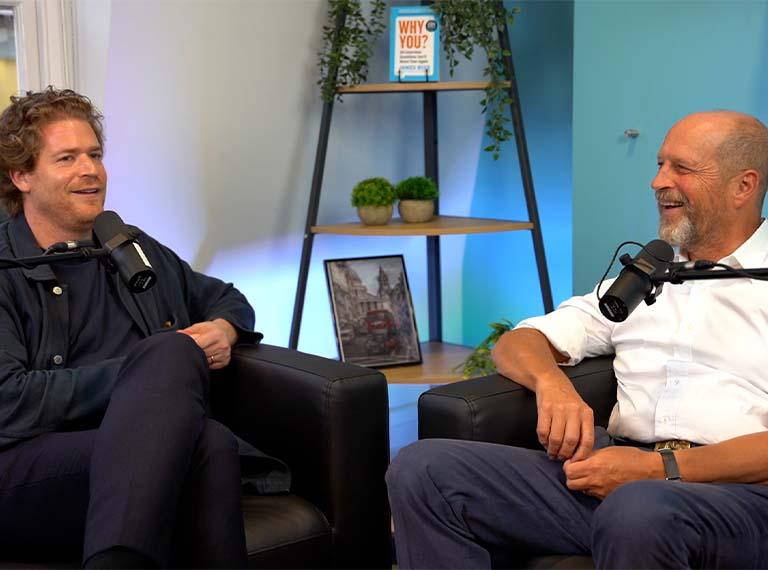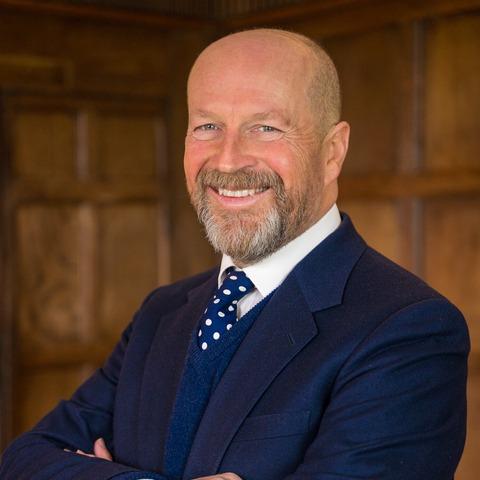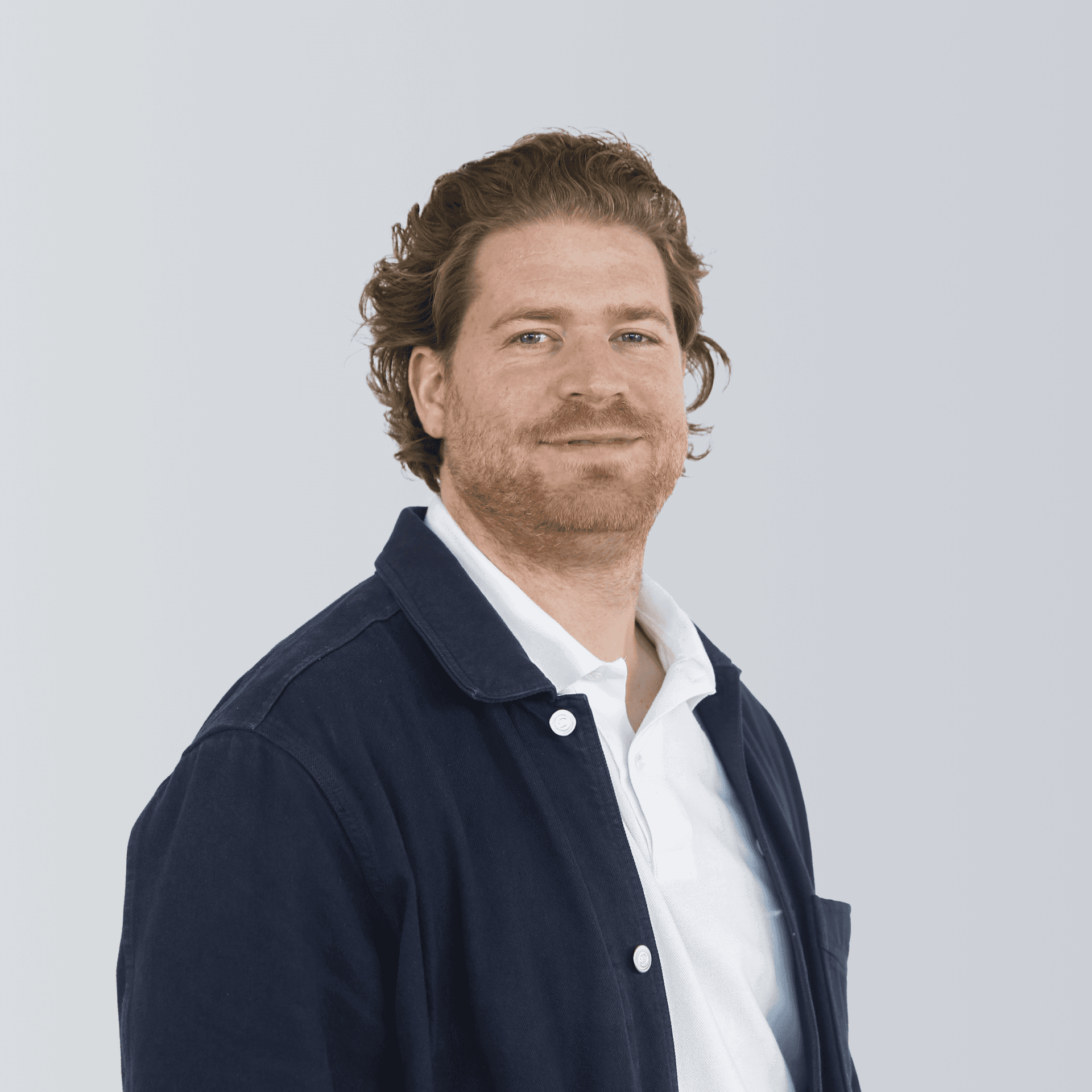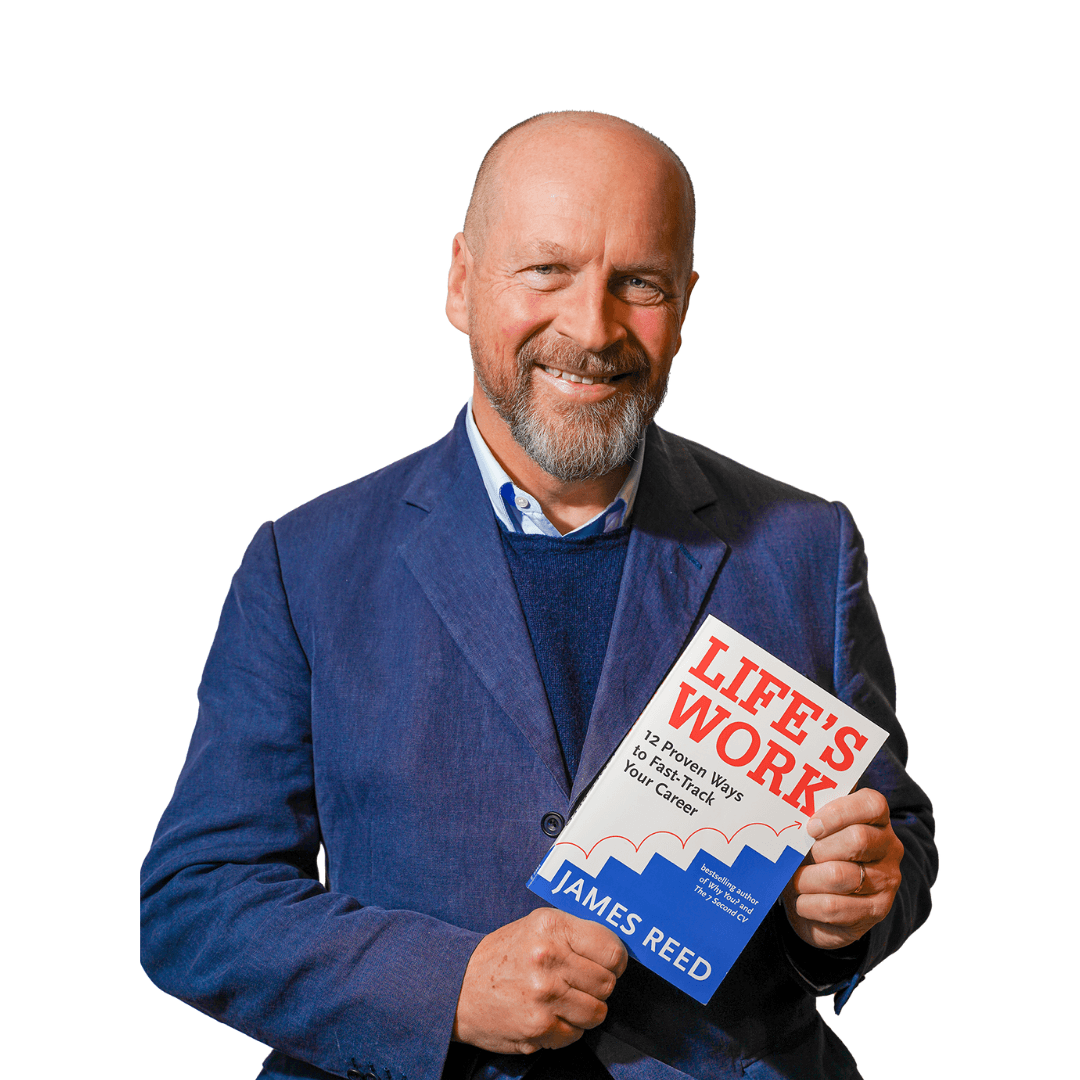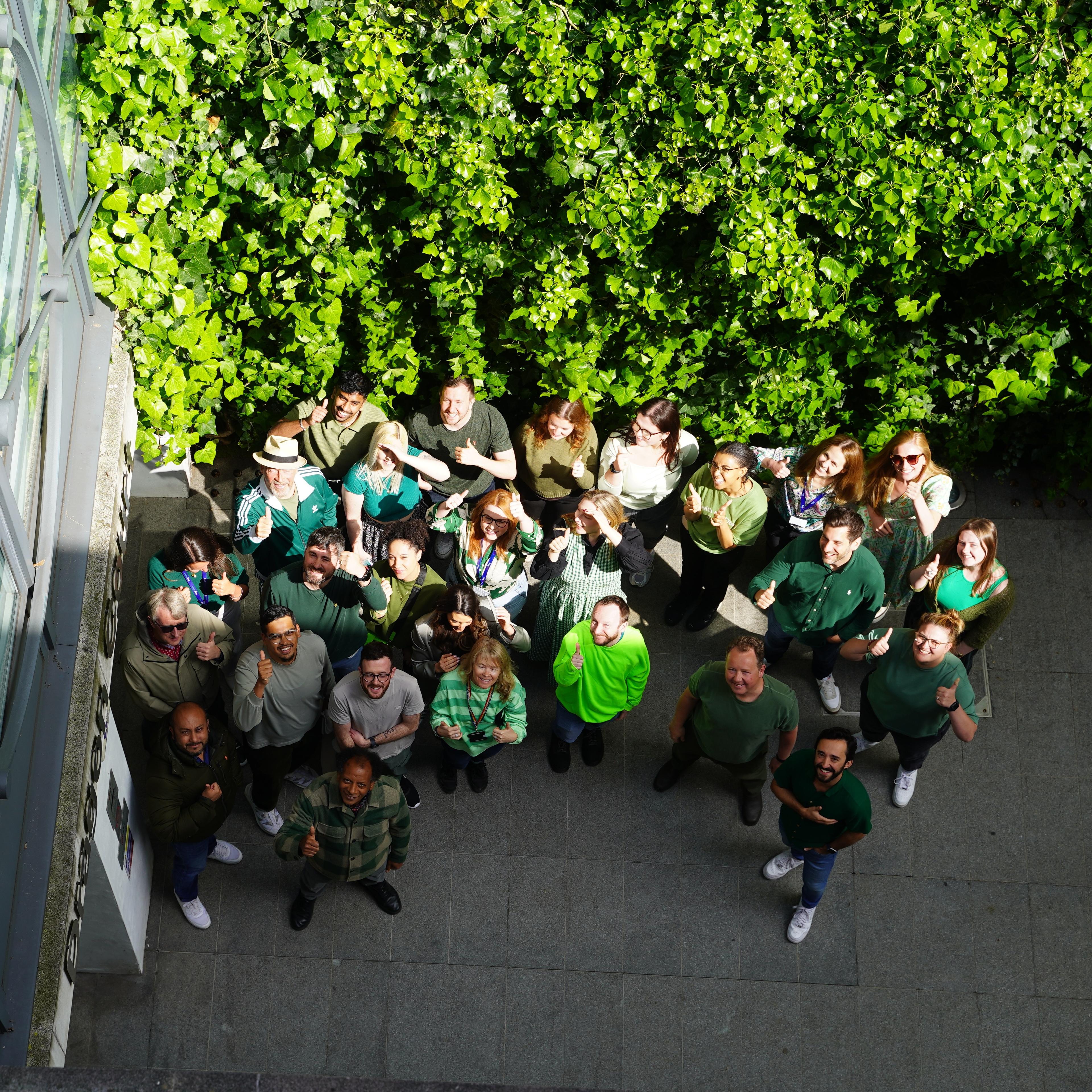Watch the podcast
Listen to the podcast
About this episode
But AI is only one piece of the digital business puzzle…
In this episode of all about business, James Reed CBE speaks to Oli Green, a trailblazing entrepreneur who has started and acquired multiple businesses across the digital landscape.
He reveals the key areas every business should be focusing on when it comes to digitisation and explains why he was able to raise a substantial amount of funding in just a few short weeks.
02:21 digital first approach
03:18 emerging trends in ai
04:47 challenges in recruiting ai talent
06:45 improving digital experiences
08:46 social media strategies
09:55 brave bison's four divisions
17:18 acquisition strategies
24:36 integration challenges
29:18 working with family
37:41 public company benefits
40:19 conclusion and future vision
Connect with Oli on LinkedIn: https://www.linkedin.com/in/oli-green-85140973/
Follow Brave Bison: https://www.linkedin.com/company/brave-bison/
Follow James Reed: https://www.linkedin.com/in/chairmanjames/
About the speaker
Oli Green is CEO of Brave Bison, a digital advertising and technology services company. Brave Bison bought Social Chain in 2023, a social media agency founded by Steven Bartlett that has worked for global brands such as KFC and LinkedIn. Oli is also Chairman of Tangent, a company that helps enterprises build future-ready digital experiences, products and capabilities with a focus on people, planet and purpose.
[00:00:00] Oli: We've done two successful fundraisings. Both have been over subscribed. Those fundraisings took about three weeks to complete.
[00:00:08] James: I'm very impressed that you could raise that money in three weeks. You said you had four divisions. We
[00:00:13] Oli: own and manage a portfolio of channels across the likes of Facebook. and YouTube and TikTok and Snapchat.
[00:00:20] James: Your business I understand recently bought Social Chain, which was founded originally by Stephen Bartlett.
[00:00:25] Oli: I actually met Steve back in a conference, a South by Southwest conference in Texas, and Social Chain was acquired last year and started off as really an agency that was brilliant at making brands go viral, but has since really grown up and it now focuses On helping brands to navigate what has become a very complex marketing ecosystem within the context of social,
[00:00:53] James: you know, you've built up what is an impressive business empire for the last decade.
What are the steps that [00:01:00] lots of entrepreneurs listening need to think about? Welcome to all about business with me, James Reed, the podcast that covers everything about business management and leadership. Every episode, I sit down with different guests, bootstrap companies, masterminded investment models, built a business empire.
They're leaders in their field, and they're here to give you top insights and actionable advice so that you can apply their ideas to your own career or business venture.
With AI becoming more and more advanced, it's safe to say that the digital era is truly upon us. But with these new ways of working, businesses face one major challenge, staying ahead of the game and their competitors. Joining me today on All About Business He's the CEO of Brave Bison, a marketing, media and technology company that helps [00:02:00] businesses thrive in the modern world.
He's acquired multiple digital businesses over the years, including leading social media company, Social Chain. That's why he's the perfect person to speak to us about building a business empire in the digital era. Ollie, thank you for coming to join me today for all about business. Uh, you're the CEO of Brave Bison.
Um, you talk a lot about helping clients get into the new era of business and becoming digital first. That's, uh, that's very much your approach as I understand it. So digital first, that goes way beyond how we work, doesn't it? I mean, it's about the delivery of services. and how we create new opportunities for people who acquire things.
[00:02:44] Oli: For me, Digital First is about leaning into new technologies. It's about being data led, and it's about taking a modern approach and identifying trends that are changing everything from [00:03:00] the workplace all the way through to how customers actually interact with your your business. Um, and I think, you know, more and more clients are investing into their digital platforms.
They're investing into their digital products and services that allow them to interact and possibly transact or at least engage with customers and users.
[00:03:22] James: So what are the sort of top things you're seeing in terms of emerging trends or themes that Companies should be thinking about.
[00:03:29] Oli: I think AI is definitely the hot topic.
Um, and it's, it's definitely a bit of a buzzword. And, you know, there are, there are lots of businesses that, um, are hiring chief AI officers, or perhaps they have an AI strategy. I think what we try to, um, talk to clients about is their existing problem or opportunity set, and then how we might. Use AI as a tool to actually provide a solution, overcome some of those challenges and [00:04:00] deliver on some of those opportunities.
So if you think of AI as a sort of force for, you know, unbelievable productivity, especially when it comes to, um, sort of data processing, um, at Brave Bison, we're using AI to create content. We're using AI to Plan and buy media much more effectively. Um, and so we're, we're still selling ultimately the same things that we were before to our clients.
But we're using AI to be more efficient, to deliver our services more quickly and ultimately to deliver better results for our clients and sometimes at a lower cost to them.
[00:04:41] James: We're delighted that you're watching this episode. Please hit the subscribe button if you'd like to receive more insights and actionable advice that will help your business and your career.
So I run a company, I like the sound of all that. How do I find people who can do this though? Because you know, you're not going to find someone with [00:05:00] five years AI experience typically because it's so new. How do you sort of recruit and build a team that can deliver all that to your customers?
[00:05:08] Oli: Well, I think that the, the first thing you need to do is really, um, Um, be very clear on what, what problems you have and what opportunities you have.
And I think that, you know, there are not a number of stakeholders in every business. And obviously you run a very large business and you'll have multiple stakeholders. But I think that, you know, the best AI works, work streams and programs really start off with some kind of workshop where you are talking through business problems and customer problems and thinking about how you might solve them.
I think when it comes to delivering the actual AI application, there's lots of ways to do that. You might be hiring teams, you might be using third parties, but I think that the, the, the, the sort of the. The bit that we see as being sort of one of the most important parts is actually [00:06:00] sort of setting yourself up for success by creating that sort of program of work and thinking about the strategic problem that you're trying to solve.
[00:06:10] James: Listening to you, I was just thinking, you know, there's a new government, the huge challenges in public services. You'd think some of this digital first AI approach might be really ripe for this moment in delivering those services. I think there's a huge opportunity there for business and public service delivery to Improve really, which is quite exciting, isn't it?
[00:06:30] Oli: Definitely. I think that you know, we always um, sort of uh promote Uh investment into digital platforms and services because we know that that's where our clients customers are Um, you'll have seen the the queuing or the virtual queuing for the oasis concert And that unfortunately didn't didn't go as according to plan, but that's a perfect example of of of uh, the new era Whereas, you know probably when Oasis was touring in the 90s, [00:07:00] people might have been queuing for tickets, whereas now they're queuing virtually, um, and they're looking to buy online.
So what's a better way of doing that? If you
[00:07:08] James: were selling tickets for a concert, how, how would, how would that be better delivered?
[00:07:13] Oli: Well, it's funny you say that because we've actually just written a blog post on the ins and outs of setting up sort of a queuing system. And it has a very few sort of technical updates that Ticketmaster should have and still can make to make a much better experience for customers.
But one of the things that I actually Thought was a missed opportunity is while you had people in the queue for in some cases, an hour, two hours, um, you know, possibly show them some kind of entertainment. You know, it's a great opportunity whilst they are engaged, uh, possibly monetize opportunity, you know, get.
Get get get get get brands, get appetizers involved. Um, there are other experiences out there whereby where you're queuing, you're actually engaged and you can [00:08:00] play a game or you're taught something and, and, and the, the, the platform is recognizing, um, the, the user is, is, is frustrated.
[00:08:08] James: But queuing is not an activity any of us particularly enjoy, but speaking for myself at least, I hate queuing.
Surely in the new era, that should be something of the past. Can't we use some sort of lottery device or some other way, technology selects people even at random. You've got a ticket, you haven't, sorry. Isn't there another way of doing it?
[00:08:26] Oli: In the new era, um, you're absolutely right. Queuing does seem slightly old fashioned, but I think that, um, Ultimately, uh, customers are still buying a physical product in the sense that they're still, um, uh, purchasing a ticket that, that, that allows them entry into an arena.
And that arena has all sorts of sort of quirks to it in terms of how space and categorization of seats. And I imagine that there's some complexity in how the back end of the Ticketmaster platform, uh, sort of processes information. [00:09:00] So there's not so much the cost on the customer side. It's more on the sort of stadium and events based side, the sort of the, the physicality of it all
[00:09:08] James: sounds to me like they should be giving you a call.
Lolly,
[00:09:10] Oli: we'd love to,
[00:09:11] James: we'd love to work with them. So give me some other examples that maybe you don't have to name names, but it's confidential, but the types of service you might be sort of bringing into the new era.
[00:09:20] Oli: So we're, we're, we're big into social media at Brave Bison. Um, we're big believers that the conversation is happening on social, um, you know, you custom customers and users are spending more and more time on platforms like TikTok and Reddit and still the likes of X, you know, formerly known as Twitter.
Um, and so we, we help, Brands sort of think about how they show up on some of those platforms, how they might target new audiences, new customer groups, as well as some of the existing customer groups that already buy their, their product or service. And we, we, we were also beginning to sort of really [00:10:00] think about how social media can shape your sort of overriding brand strategy as a business, um, given that social is such a good, um, mechanism for.
Testing, uh, how people react, uh, products or messaging or other forms of, of, of, um, sort of alternative use of your product.
[00:10:21] James: So your business on Sam recently bought social chain, which was founded originally by Stephen Bartlett, obviously well known in business and of the dragon's den. So is that part of, is that part of this mix now?
Is that what? They do in particular.
[00:10:36] Oli: Yes. So brave bison has four divisions, one of which is social chain. Um, and social chain was acquired last year. So in February of last year, um, and it's kind of the definitive, um, original social media marketing firm. Um, I actually met Steve, um, back. In a, in a, in a conference, a South by Southwest conference in [00:11:00] Texas, I think it was sort of 2017.
And, um, he had just been in the times I think for, um, having a, having a slide put into his office. Um, but social chain, uh, work with some extraordinary brands, um, and started off as, as really an agency. That was brilliant at making brands go viral, but has since really grown up and it now focuses on helping brands to navigate what has become a very sort of complex marketing ecosystem within the context of social.
There are so many different platforms. There are lots of different audiences. Um, each platform, you know, releases a new product or feature pretty much every one to sort of three months. And so, you know, brands want a partner to consult with on, on best in class, um, as well as help with things like Sort of content production and and possibly, um, sort of strategies and collaborations that see [00:12:00] creators or influences get involved and partner with brands to to sort of promote a brand's message or product.
So social chain is a an end to end social media. Uh, agency. Uh, and we're currently working with everyone from LinkedIn all the way through to the likes of Jameson's and Shark Ninja and Green King and, um, a whole host of other, other brands, including actually some of the platforms themselves. So TikTok and Pinterest, um, as well as LinkedIn, actually customers, customers of ours.
Very interesting. You said you had four divisions. That was one. What, what are the other three? So we have a division called Brave Bison Performance, and that is a digital media agency that plans and buys digital media on platforms like Google and YouTube and TikTok and Amazon. Um, and effectively, we drive sort of bottom of the funnel conversion.
So we, we, we help clients spend, spend money online, um, to [00:13:00] drive revenue and drive growth. Conversion on their websites or apps. Um, and in that division, we work with the likes of Curry's and a new balance in the other two. Um, so we have a division called brave bison commerce. Um, and that is a sort of quite tech and delivery led business that helps, uh, retailers and e commerce businesses think about that.
Sort of digitally commerce, um, experience, um, and really upgrade it and level it up. And, um, there's a sort of a new wave of, of technology called composable, which sees businesses build platforms using lots of different technology components. Um, and we're experts in composable commerce and we, um, consult and, and actually implement, uh, new solutions for, for, for customers.
Um, and our last division is actually a media network. So we own and manage, um, uh, a portfolio of, of channels across the likes of [00:14:00] Facebook and YouTube Snapchat, some of the channels that we own ourselves. So we own channels called say what and the hook. Um, and we also run channels on behalf of rights holders or companies that, um, have IP.
So, uh, we're running the U S opens, um, YouTube channel. Um, we work with the Australian open, we work with the PGA tour, um, and the DP world tour.
[00:14:23] James: So listening to you, it sounds like there are a number of different ways you can go if you want to be digital first, or the number of different strategies you can take as a business.
And the one that's right for you, or several of those might be right for you, depends on the nature of your business and what you're doing, I suppose. I mean, we've worked with you in Um, over the years, you know, we've done campaigns, um, we've built websites and we've found that experience, um, please say very positive.
Um, because you've got another business, something you called Tangent. And my recollection is Tangent started out in printing. You were doing quite a lot of printing, but you took that, [00:15:00] you've literally, you know, walked the talk because you took that business into a digital first. Business. Tell me a little bit about that journey.
What
[00:15:09] Oli: So, so tangent is a sort of digital product to an experience agency. So we help large enter enterprises, um, to really sort of reimagine that. We help large enterprises reimagine their digital experiences. Um, and typically that, that evolves a sort of upfront piece of consultancy and thinking about their business and thinking about their, their customer groups.
And then it usually results in some kind of, um, uh. Digital products transformation. So the actual design and build of some kind of website or app or chatbot.
[00:15:43] James: So you're the CEO of Brave Bison and you're also the chairman of Tangent. So you're involved with two companies. You know, you. built up what is an impressive business empire over the last decade.
What are the steps that, you know, lots of [00:16:00] entrepreneurs listening need to think about? I mean, every business is different. Every journey is different, but what did you have in your mind when you went about doing that and what were you looking to accomplish and how did you move forward?
[00:16:12] Oli: I think I've always been very Interested and aware of my competitor set and, and, and, and companies that, um, are growing within, within my space.
Um, and I think that, you know, reading and sort of research is, is, is so important and following companies on LinkedIn and, uh, going to events, be it, um, trade events or conferences, but there are some incredible events where you, you know, you can go in and hear. Hear from, um, people that are doing interesting things, and some of them might be competitors and some of them might be partners and some of them might be suppliers, but, um, that there's sort, there's a sort of, you know, the, the, the business ecosystem is incredibly diverse and I, I've always [00:17:00] found it really useful.
Uh, to sort of to to to read and follow and and also to meet people. Um, but, uh, I mentioned South by Southwest, which is a sort of tech and media conference in Austin. Um, but that's, uh, you know, a great place to go and learn and reflect and think and network with both entrepreneurs and big business. Big businesses that are successful in their field and are, are thinking about the future and thinking about disruption and thinking about how to get ahead.
And I think that, um, it's probably not a coincidence that, um, South by Southwest is based in the US. I think that in the US there is a very strong determination to succeed. And I think that, um, success is celebrated in a, in a really fantastic way.
[00:17:52] James: So you're, it sounds like a voracious learner. You really want to know what's going on.
You're very curious.
[00:17:59] Oli: Yeah, I [00:18:00] think, I think learning is important. I think I'm definitely not afraid to copy and to follow. I think that, um, you know, it's a, it's a big market. Um, and sometimes you can do something better than someone else can either because you have a, a particular, uh, Um, sort of platform or client, or perhaps you have more capital.
But I think there's, I'm a big believer of there's nothing truly new under the sun. And so the answers are out there. You just have to have to have to find them.
[00:18:29] James: So in this technology space, there are certain people who have certain expertise, you know, who are very good at certain things. If you want to bring them into your world, I imagine you're making acquisitions or buying businesses to do that sometimes, as well as hiring people.
Is, is that your model in part?
[00:18:46] Oli: Yeah. So Tangent, um, uh, made one acquisition, um, and Brave Bison has made four so far. So acquisitions have definitely been a big part of, um, Of, of, of, of business building for [00:19:00] me as well as organic growth and as well as expanding relationships with existing clients and winning, winning new clients.
Um, but as a, as a public company that wants to be bigger, um, brave bison will, will inevitably make more, more
[00:19:14] James: acquisitions. So this is really interesting to me because you've done five times as many acquisitions as I have in my career. We did one and it wasn't very successful and you seem to have developed a technique for doing it much more successfully than ours.
What, what are you looking for when, when you see a company and you begin that? What, what originally sort of gets you thinking this might be one for us? And, and then how do you sort of evaluate those companies?
[00:19:42] Oli: So I think that, you know, first of all, um, you know, we, we probably look at anywhere between, 30 and 50 businesses a year to buy and we probably end up doing one, maybe two acquisitions.
So, um, there, there are people in the market and especially in my space [00:20:00] that, you know, by much more aggressively a lot of frogs, well, I, I would say that we're meeting a lot of, uh, Um, interesting businesses and sometimes the timing isn't right. And sometimes you think it's a great business, but you just can't, you can't quite work out how you would buy it or how you would actually create value by buying it.
Um, I think that when we look at businesses, you know, we, we, we really, um, think about everything from the, the clients that they work with, the markets that they're in, Whether or not they have, uh, a complimentary capability to ourselves, or is it sort of more of the same? I think we, we, we, we try and get a good, um, sort of temperature for the culture of the business as well.
You know, is it, is it founder led, is it sort of mission driven? Um, how corporate is it? Because these are all things that will have, uh, I think a big impact on, on any kind of integration planning that, that, that you might [00:21:00] want to. That you might want to have I think for us so far We have not Bought a business and left it in the corner.
I think I think you can do that. I think if if our business is of scale Um, and it has the right management team and it has the right plan then, you know you you are able to do that, but I think the businesses that we've bought we've bought because Um, we've had a vision that one plus one is going to be more than two.
It's going to be three or four or five um And so the acquisitions that we've made today have all been integrated into, uh, the brave by some platform. Um, and what does that mean? It means, you know, they effectively, um, you know, we brave bison operates as one company. So we have, you know, one christmas party.
We have one slack channel. Um, there is a board meeting every month with with one leadership team. There might be You know, different departments, different business divisions, there might be even different leadership [00:22:00] teams for each one of our divisions, but it looks and feels like one company.
[00:22:06] James: So that that's prompted a couple of questions.
You said you look for companies that are founder led, mission driven, corporate, are those positive things for you or are they things that depends on the founder and the mission, I suppose. But what taught me through that a little bit
[00:22:20] Oli: more? I think we, we look for companies where. We can see ourselves working with the people.
I think that, you know, people, um, it's, it's sort of Do you want the founder to stay or not, typically? Um, it, it, it kind of depends on what their agenda is. Um, in, in In recent cases, um, the, the management teams have all come, come into our business, but the founders have actually exited. Um, that's not to say that we wouldn't love to work with founders.
I think it just depends on, on their journey and where they are sort of on it. I think that though, you know, as well [00:23:00] as looking at sort of the underlying business, like the. You know, the technology and the client contracts and the financials. I think we really think long and hard about, can we work with these people?
You know, do we want to speak to them every day, week, hour, whatever it is? Do we want to be on planes with them? Do we want to be sharing hotels with them? Because ultimately, um, you know, we are a people based business and I think every business is a people based business.
[00:23:26] James: I'm your host, James Reed, chairman and CEO of Reed, a family run philanthropy company.
If you'd like to find out more about Reed, visit us at reed. com. Thank you. So some people listening will be thinking, I want to build, I'm a founder, I want to build a business and sell it to someone like Ollie. Um, yeah, because I suppose the psychology of lots of founders is that they want to realize again and maybe do something else afterwards, which I can see why they don't necessarily stay.
Um, what sort of tips would you give someone who's on the [00:24:00] early phases of a journey in terms of building a business that is acquirable, desirable, you know, attractive to a company like yours? What would you say you need to get right?
[00:24:11] Oli: I think, um, you know, your, your management team is really, really important and, and, and showing that the business, um, doesn't just run off your blood, blood, sweat, and tears.
I think it's really important to have, you know, a strong CFO, a strong, um, Uh, sort of head of marketing. I think I think that the senior team is incredibly important. I think that, you know, trade brand is really important and making sure that you're you have a good reputation in the industry, both amongst, um, prospective staff as well as prospective clients or customers.
Um, I think that It's technology and having some kind of proprietary systems or platforms [00:25:00] is definitely something that people value because they know that building them from scratch is, is, can be difficult. Um, I think there's, there's lots of things that you can do. I think you, you know, you might want to have a good advisor.
Um, maybe a, a, a, a, a member of the board or possibly a, a sort of more, more formal advisor. But I think that, um, if, if you do get to a process, um, of, of sale, it's, it's, it's useful to have someone that's a little bit more removed because I think that those few months where, um, uh, the transaction is being sort of undertaken, it can be very stressful and it's, it's useful to have support, I think during those times.
[00:25:44] James: No, it's very helpful. I'm sure people this thing would find that very useful. Um, you, you also mentioned about integrating. You said that the companies you bought hadn't been left in the corner, they were integrated. That's not easy necessarily when you're putting two cultures together. There are [00:26:00] other certain things that you feel a must do is when you're integrating a I
[00:26:06] Oli: think that when we, when we sort of buy a business, the integration plan always looks a little bit different.
Um, I think we try and get the sort of basics, uh, pretty consistent. So, you know, we have one staff handbook and there's one sort of, um, Uh, there's one policy for things like holiday and, um, we do, we do pay rises twice a year or we do sort of, um, appraisals twice a year. So there are a few things that we sort of looked, uh, um, to, um, encourage the business that's being integrated to sort of take up.
Um, but I would say that every acquisition is, has, has been a bit different and we've only done a few of them. You know, for brave bison. So I'm sure it will continue to, uh, you know, integrations are challenging. Um, you know, you're not buying a property or a, um, a sort of a warehouse. Um, [00:27:00] and so you've got to think about roles and responsibilities.
You've got to think about trade brands. Um, you've got to think about customer relationships and client relationships. You've got to think about, um, Um, even, you know, technology and, and, and, you know, for example, um, quite a few of the businesses that we've bought have been on, they've been Google houses and we're a Microsoft house.
Um, and so actually porting people over from Google to teams is, is, is, is actually done.
[00:27:28] James: Yeah. Because we've got one business, we've got Google and teams in our business, which grown organically. That was my fault.
[00:27:34] Oli: Yeah. So how
[00:27:35] James: did that journey go? Because I'm thinking of doing that myself.
[00:27:37] Oli: It was tricky. And we compromise because, um, whilst we use Microsoft Teams for all video calls, we actually use slack for instant chat.
So rather than use Microsoft's instant chat product, we've got a fused version. We use Slack for instant, instant messaging, and we use Teams, um, in the most part for video calls in less clients, [00:28:00] uh, demand that we use, uh, other technology.
[00:28:03] James: So I've observed, you know, one of the reasons we've pursued, I suppose, an organic strategy over the years, I think it suits recruitment because if you're buying a recruitment company, you're buying people effectively and they can all walk out the next day if they don't like it.
So the sort of culture is very important and developing a culture that people want to be a part of and enjoy. When you, when you buy a new company, you're putting two cultures together. Does one tend to be sort of consumed by the other or do they fuse in some way? What, what happens culturally?
[00:28:33] Oli: I think they do fuse because I think that Um, well, certainly for a business like ours, our culture is always evolving and it evolves based on the clients that we work with.
It evolves based on the new staff that come come to work for us. And so I think that our culture is always evolving. Um, I definitely do think that, um, when you integrate a business, you know, you do have to leave some stuff at the door, but at the same [00:29:00] time, you also gain stuff. Um, but I think culture is one of these things that sort of transcends pretty much everything you do and so it's very difficult to plan for it and to, um, consciously make edits to it.
Um, I think that having, um, Uh, a sort of long term view for your business and having someone, um, or some people that are sort of responsible for driving it and growing it with a view to thinking about the long term really helps, um, create a certain ethos. And you, you'd see that ethos in a, in a, in a, in a business that is private and, and, and, and family owned like yours.
Um, and I think that you, you see, um, You know, it's similar, um, sort of essences in, in, in businesses that maybe are founder led and are sort of, you know, mission driven. I entered a very purpose driven, um, that might be, you know, venture capital backed. So the capital structure could [00:30:00] be very different. Um, but, um, I think the cultures can be, can be, can, can, can always, can always be similar.
[00:30:07] James: So what have you found difficult about sort of building this growing business, you know, both by acquisition organically? Most sort of challenging things you've had to deal with being, you know, we're going to be things that other people this thing might experience.
[00:30:24] Oli: Well, certainly, um, integrations of businesses are always really difficult.
Um, I think that, you know, my brother and I are business partners and, um, he tends to focus more on the acquisition side of the business. And I tend to focus more on the sort of people side of the business. Um, But then we also have the actual existing business toe to worry about. And as a public company, forecasting is really, really important on making sure that we hit or even exceed our forecast is really, really important.
And so, um, I would say, you know, over the last few years, [00:31:00] um, we've had various different sort of global and national challenges. That have an impact on, um, advertising and have a have an impact on consumer confidence. And, um, it hasn't been the sort of the easiest time to trade an advertising and marketing business.
Um, and at the same time, when you're, when you're managing acquisitions and having to forecast, um, within an inch of sort of 10 percent give or give or take, um, you know, that that's that, that does present a bit of a challenge.
[00:31:32] James: Yeah, I mean, if you forged a business over the last five years, I mean, in the past, we'd have said that would place you well for the future because it's going to get better for sure.
But it's hard even to know that now. It's that we have to be so adaptable in business. I feel exactly the same way as you. You mentioned you work with your brother. I mean, there are lots of successful examples of. Brothers and families and siblings working together. How'd you, how'd you make that work yourself?
Because I think there's some strengths in, [00:32:00] I mean, you can duplicate yourself in a way with someone you trust.
[00:32:03] Oli: You can duplicate yourself. I think that that trust is unbelievably strong. I think that Theo and I are very complementary, you know, we have very different skills. Um, I think we both, you know, respect one another and appreciate, um, one another's skills.
Um, you know, he's, he's, he's, he's unbelievably clever. Um, very financial, um, very strategic, very analytical, um, and also has a, has a, has an eye for operations. Um, I think I'm slightly more, um, people focused and, um, I, I love, Um, being a bit of a recruiter myself, actually, I love thinking about how great people can fit into our organization.
Um, and then working, um, with Theo, we have a, an unbelievably strong CFO, um, that helps us to, um, deliver [00:33:00] on, on, on what we set out to deliver at the beginning of the year from a financial and commercial perspective.
[00:33:05] James: So that's what, what I would call a triumvirate. That's when. two brothers in the CFO. Is that how you come to decisions?
Because if you and your brother disagreed on something, how, how are you going to decide? I guess you could pull rank or do you involve the CFO?
[00:33:19] Oli: Um, I mean, we're, we're, we're usually very aligned. So, um, we are the three executives on the board, myself, Theo and Philippa, and then we have two non executives on the board who are both independent and they also have a, have a really important, you know, part to play and, um, they are very good at Questioning elements of our strategy and ultimately, um, signing off as a board on any acquisitions or investments that we're going to make.
But I think that the, the plan that the, our business has is, is a robust one that is fairly consistent despite the fact that we have to reinvent ourselves. So often I think the business plan is, is the [00:34:00] same. Um, it's just sort of maybe the, the. the trade proposition and the sort of the capability focus that maybe evolves.
Um, so I think it's, it's myself, it's Theo, it's Philippa and then Matt and Gordon who's on our board.
[00:34:12] James: So you mentioned this word reinvention. I mean, you're in an incredibly competitive space where technologies are changing all the time. How do you make sure you stay competitive ahead of the game? How do you do that?
How do you keep reinventing?
[00:34:29] Oli: I think there are, there are lots of ways to reinvent yourself. I think that, you know, you have to be, um, well informed and, and to be well informed, um, you have to go to the trade events. You have to keep an eye on your competitors. You have to speak to clients about what they're seeing and how they're trading and what problems they they're sort of encountering.
Um, Yeah. I think that there are, you know, there are lots of social media platforms to be all over. And I certainly look [00:35:00] to America and certainly the West Coast, um, for, um, sort of technology advancements. And it certainly feels like it's not a coincidence, um, that some of the sort of, um, Most compelling, um, AI companies and machine learning companies are based, um, on, on the West Coast.
Um, obviously you've got all the venture money there as well. But I think the, the, the level of, of innovation and hunger and ambition and, and sort of, uh, Um, technical capability frankly is, is, is really quite phenomenal. Um, and so keep keeping an eye on what, on what the U S is doing. Um, and, and also trying to think about just, just sort of more, um, I guess more macro and, and making sure that your, um, Um, at the same time as sort of reading around your industry and, and, and any emerging trends, you're also trying to work out how they play into the more sort of global macro [00:36:00] environment and what, what, what, what's happening around the world.
[00:36:03] James: So one way of staying ahead in the UK at least is importing the latest ideas from America. That that's worked well as a strategy, has it?
[00:36:13] Oli: Yeah, I think that, um, Being, um, observant of what these unbelievably innovative, fast growing, um, you know, digital first businesses are doing, I think is, is always, um, is always interesting and is always, is always relevant.
I think lots of the founders, um, or the CEOs or the execs, uh, uh, are well worth listening to on, on podcasts or, you know, lots of them have podcasts. Books out. And I think that those that they're, they're, they're great sources of knowledge and inspiration. Um, as well as, you know, looking at competitors and making sure that you're signed up to newsletters and you're following people on Instagram and you're, you're looking on Twitter [00:37:00] because, um, I think there's, there's information all over the place.
[00:37:04] James: I mean, forgive me saying this, but you obviously work really hard because you're in your leisure time. You're looking at all these other channels and reading. And I mean, is that big part of what it takes? You have to be a grafter.
[00:37:16] Oli: I do. I do believe in working hard. Yeah, I think that sometimes that is, um, uh, muted as old fashioned.
And I don't want, um, people not to have a work life balance. But I think if you want to be successful, you, you, you do have to work hard. It's, it's, it's that
[00:37:35] James: simple. Well, I've been around a while and that's something I've observed, you know, for the people who work really hard, the more you put in, the more you get out.
I think of it sometimes as work life integration. I think if you enjoy your work, then what's the, what's the, what's the issue as long as your family doesn't mind.
[00:37:53] Oli: Yeah, exactly. I think that, um, I think probably. To work very hard, you do [00:38:00] have to be sort of passionate. Um, and you do have to be interested.
And if you are those things, then as you say, um, you know, there are parts of your work that will be more enjoyable. That might not mean that All of your work is enjoyable. And if you're, you know, working on a investor deck or a presentation, you know, late night, that, that might not be the part that you enjoy, but you might be really interested.
You might be, uh, you might really enjoy a podcast by, you know, uh, a sort of AIVC that's just come out.
[00:38:31] James: Yeah. So yeah, there's a mixture of ups and downs in any job, but I think being passionate about what you do and that's why we talk about loving Mondays. You know, it's so important. You talked a little bit about being a public company, and I'm interested in just exploring that with you a minute.
What are the positives, as you see it now, of being a listed company in London?
[00:38:52] Oli: So I think that, you know, we've had a really good experience, um, being a public company. Um, I would say one of the big [00:39:00] positives is access to capital. You know, we, we've done two Successful fundraisings, both have been over subscribed.
Those fundraisings took about three weeks to complete. Um, if we were a private company, um, and we wanted to raise money from a private equity firm or a venture capital firm, then the process could be, you know, six months and there would be all sorts of investor committees. Um, I also think that you have to forecast very, very well for a public company because, um, you effectively have to, um, declare if you are trading plus or minus 10 percent versus what the market thinks you are, are supposed to deliver.
Um, and, and I think that, you know, that's an important skill, being able to forecast how your business is going to, um, Perform is really why do you think that's an important skill? Well, I think that, um, you know, if you put [00:40:00] together a forecast that is overly ambitious, um, you know, you might end up with a problem with cash flow or you might, um, Upset your private investors because you've, you've, um, promised something and then you've, you've not delivered.
I think it's, it's very easy to put together a, uh, uh, you know, a, a deck of slides, um, that talks about, uh, you know, market potential and strategy and, um, what you're going to do. I think it's more difficult to actually do, I guess it, it forces you to. Think about things very clearly and forces you to be honest with yourself about how things are doing and how things are going
What gets you up on a monday morning Um, well, I love, uh, listening to, uh, you know, loud music in the [00:41:00] shower and I don't know on the way to work. So, um, really quite sometimes even like heavy metal, um, well, there's, there's, uh, this is slightly embarrassing, but there's a German heavy Ramstein that has a couple of, um, very aggressive tunes that, let's say, that really gets me going.
Exactly. Before, uh. before a fundraising or before any kind of a bid. I certainly listened to that once
[00:41:28] James: or twice. So that gets you up on the money. And the second question is, where do you see yourself in five years time? This is an interview question that many people get asked, but as an entrepreneur and business leader, where do you see yourself?
[00:41:40] Oli: I think that my brother and I are very keen to, to build Brave Bison into a much bigger company. I think it will have, you know, more divisions. It will be, it be in more, more markets. Um, I don't think it will be inherently different in terms of, I think it will be a technology enabled [00:42:00] digital advertising and technology services company.
But I think it will be bigger. I think it will be more famous. I think it will be working with, um, more CEOs, more CMOs, more CTOs across, um, the same sorts of programs that it's currently working. So more of the same, but bigger. But thanks very much,
[00:42:21] James: Ollie. Thank you. I think I'll leave you alone now. Thank you to Ollie for joining me on All About Business.
If you'd like to find out more about Ollie and building a business empire, follow at Brave Bison.
All about business is brought to you by Reed Global. Learn more at: www.reed.com
This podcast was co-produced by Reed Global and Flamingo Media. If you’d like to create a podcast to get elevate your brand, visit Flamingo-media.co.uk
